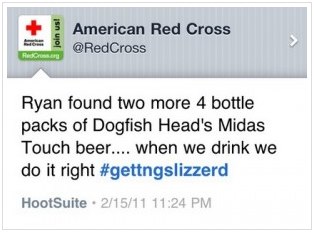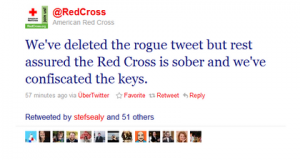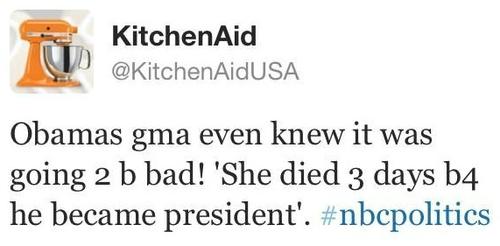Expert Feature: Don’t Let Social Media Blunders Ruin Your Day
Social media blunders happen to the best of us.
We’ve all tweeted or posted something at one time or another that we wished we had not yet posted, right? Hopefully, they were personal and not business posts.
When these blunders happen to brands, the backlash can be very traumatic for the business, the customer, advocates and followers.
Great Examples To Follow
Over the years, we’ve noted a few social media doozies that are great examples of what not to do:
American Red Cross
An employee accidentally posted to the organization’s Twitter instead of a personal account about getting drunk.
The American Red Cross had a sense of humor when they resolved the situation, and surely they spent a lot of time doing damage control with their public relations people before posting this response:
(Editor’s comment: If you would like to donate to the Red Cross to help the victims in Moore, OK, then click here.)
Kitchen Aid
A Kitchen Aid employee tweeted a personal opinion during the last presidential election that threw a lot of people into a frenzy:
Again, an employee made the mistake of posting to the wrong account. Kitchen Aid responded with an apology and so did the employee.
The Benefits and Disadvantages Of Social Media Dashboards
The use of social media dashboards allows social media managers to view multiple accounts in one place.
However, dashboards also create the opportunity to make mistakes, especially when personal accounts are combined with corporate accounts.
A corporate policy requiring employees to keep their personal accounts separate could have prevented this situation in the first place.
This situation also brings to the forefront another issue – should employees mind their manners and their comments in their personal profiles in case they’re viewed by their employers’ management, customers and vendors?
We definitely don’t advocate that brands have access to employee accounts for viewing. However, education and a corporate policy about employees’ public posts could help prevent the following type of social media nightmare.
A Ketchum employee, on his way to a major presentation at FedEx in Memphis tweeted:
“True confession but I’m in one of those towns where I scratch my head and
say ‘I would die if I had to live here!'”
By the time this guy got to the door of FedEx, FedEx employees already notified management of the tweet and he was in pretty deep.
Ketchum and the employee publicly apologized and the presentation happened as planned.
Advice We Give To Our Clients
We always tell our clients to think about what they’re posting – and if they aren’t sure if their words are appropriate, then they shouldn’t post.
That rule applies to business and personal profiles.
“If you’re not sure you should post it, DON’T!”
~Melanie Yunk
By creating a social media policy for your company, social media blunders may be avoided or at least the risk is reduced.
The company that employs a policy and spends time educating employees about the risks of rude posts on employee profiles will reduce the opportunity to make blunders that can be damaging to the company and career-limiting to employees.
- Pintervention: The Pinterest Addiction Finally Exposed (Humor) (baybusinesshelp.com)





Melanie, This is an informative post that should serve to keep companies on alert for posts that can get them in trouble. It’s really hard to monitor what your employees do, but it doesn’t hurt to try to ensure they’re not saying stupid things with their personal accounts.
As for the company accounts I’d agree with you that mixing personal and company accounts on a dashboard is a recipe for disaster. I know HootSuite will allow for different levels of use in that a lower level person can post the updates, but a manager can review, then actually make the posts live. This type of setup can go a long way to preventing simple user error.